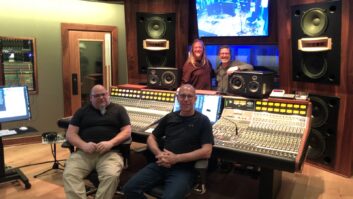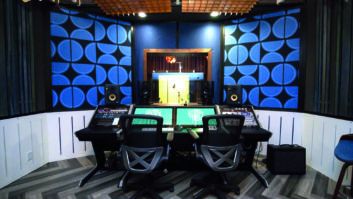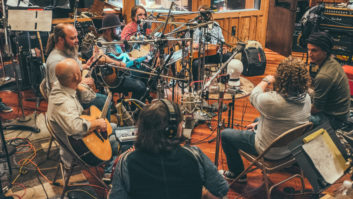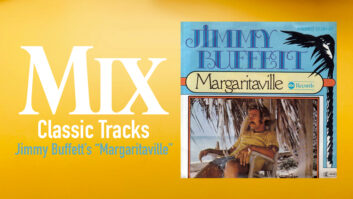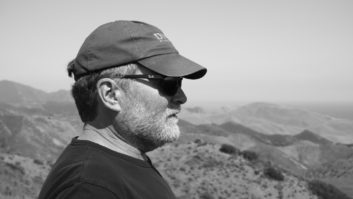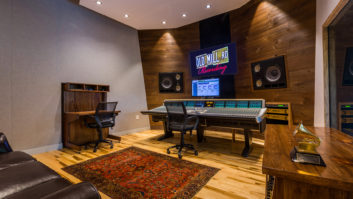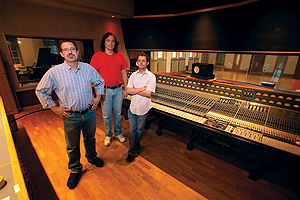
Left to right: director of operations Pat McMakin, chief technical engineer Sal Greco and studio supervisor Steven Crowder at the custom Neve 8078 console in control room A
Ocean Way Nashville has been considered world-class since it was founded by studio owner/engineer/visionaries Allen Sides and Gary Belz in 1996. Some newcomers to the Nashville studio community may have considerable dues to pay on their way to the top. However, with two of the country’s top studio names behind it, a beautiful design by the owners and studio bau:ton, and the sheer magnificence of the gray-stone church that became Studio A, Ocean Way had little to prove.
Five years after the studio’s founding, the facility was purchased by Nashville-based Belmont University, and studio management undertook the admirable task of supporting world-class commercial studio sessions while also playing a role in educating audio engineers, musicians and artists.
Director of operations Pat McMakin, who joined Ocean Way two years ago, insists on excellence in every aspect of the facility. “We work closely with each client to ensure that the planning and execution for their sessions provides an impeccable experience. Our entire staff understands that we are a service business.”
One aspect of the way Ocean Way operates that’s most gratifying to McMakin is the way the studio staff, led by chief tech Sal Greco, still get their hands dirty and customize gear: “Sal is a terrific tech. He was at Electric Lady for years and at Paisley Park with Prince for a number of years. We don’t just buy stuff and plug it in. We hot-rod our desks, monitors, mics and other equipment as needed.”
Recently in Studio A was Grammy-winning engineer/producer Jacquire King, who did three-and-a-half weeks of tracking with hot L.A. band Cold War Kids. “Everybody was in the [live] room with their instruments and amplifiers,” King says. “We achieved separation with gobos and positioning the instruments—no real isolation—and it was a wonderful, creative environment. The Cold War Kids loved it, and my experience there was perfect. I love the way the room sounds; the tech staff works really hard to keep everything up to speed. The control room is really a comfortable space, and I felt like I had elbow room; I could walk all around the room and understand what we were listening to.”
After King’s project wrapped up in Studio A, The Judds went in with engineer Jeff Balding, who says, “The old-church vibe with the high ceilings and stained glass, the ‘sound’ of the room and that sweet Neve—there’s something about those old Neve consoles that resonates inside me.”
Other recent projects at Ocean Way include Blake Shelton with engineer Steve Marcantonio and producer/engineer Scott Hendricks, various orchestral recordings and Troy Olsen working in Studio B with engineer Ben Fowler, who now has an office/workstation at the studio.
Studio B—with its 23×32-foot tracking room, two iso booths and hot-rodded Neve VRP—is Ocean Way’s mid-sized studio. “[Studio B] is large enough for band tracking, fully outfitted for mixing or a great place to do overdubs,” says McMakin, who also notes that Studios A and B also have Allen Sides’ custom-designed Ocean Way monitors.
Studio C recently hosted surround mixing with Fowler, remixing a Lynyrd Skynyrd live DVD and a performance for PBS’ SoundStage. Room updates over the past year include a new Digidesign ICON, a JBL LSR4328P surround system and a host of other gear. “I wanted to have a room that’s fully digital, where we could do surround and post-production,” McMakin says. “But the C room still has great vintage stuff. There’s a Fairchild, over a dozen varieties of mic pre’s and all the major compressors, which provides us with a third price point without sacrificing the quality Ocean Way is known for.”
Ocean Way also works hand-in-hand with Belmont’s Mike Curb College of Entertainment and Music Business, treating the college as one of the studio’s top clients. Classes are scheduled the way sessions get booked, and students have the opportunity to learn in a world-class environment.
“While still at Sony ATV, I chaired an advisory board for Belmont University’s Music Business program for about five years,” McMakin explains, “so I’d had a relationship with Belmont over the years and am an alum of the program. A couple of years ago, when they reached out to me to manage the studio, I thought it was a good fit.
“Ocean Way provides Belmont with a resource that few, if any, other universities enjoy,” McMakin notes, “and Belmont provides a well-trained workforce who can assist the veteran staffers and help with basic studio tasks. To have a talent like Sal (and other working engineers) teaching students in a real-world environment is invaluable.”
McMakin’s 30-plus-years’ experience engineering, producing and managing Nashville studios (including 25 years with Tree Publishing/Sony ATV/Soundshop Studios) means that he’s just as invested in Nashville’s music business community at large as he is passionate about running a top-end studio complex. The studio frequently serves as a “town hall” by hosting events for NARAS, AES, AF of M, Leadership Music and many others
Times are tough in the music industry, but McMakin is convinced that better days are ahead. “We always want our emphasis to be on recording great music. We’re willing to do what makes sense to work with engineers and producers to create great recordings,” he says. “We will continue to stay competitive while offering the Ocean Way standard of quality. It’s going to come back around, and I want Ocean Way to be that studio where people say, ‘They were there for us when we needed a great place to record and they were flexible enough to make it work.’”
